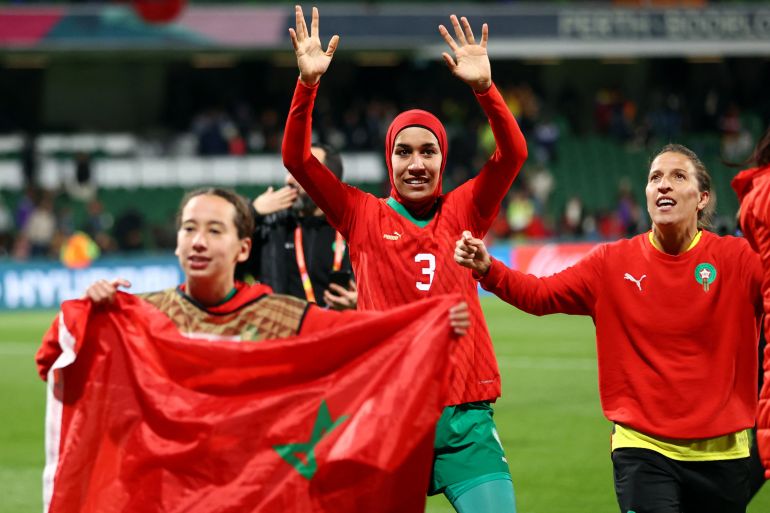Pitch to progress: Lessons from Morocco’s Women’s World Cup success
By investing in women’s football, Morocco also invested in gender equality.

Earlier this month, Morocco’s national women’s football team, the Atlas Lionesses, made history by qualifying for the last 16 of the FIFA World Cup, after beating Colombia and knocking out Germany, on their first-ever appearance at the tournament. The team eventually lost to France and exited the cup, but by then its members had already won the hearts of millions of football fans around the globe with their underdog story.
By claiming the title of the most successful debutant team in the tournament’s history, the Atlas Lionesses not only showcased their excellent football skills to the international community and made their nation proud, but also emerged as symbols of women’s empowerment in their home country and beyond. Most importantly, they demonstrated to world governments that well-thought-out, long-term investments in women’s sports would yield many benefits, from international sporting success to advancements in gender equality.
Keep reading
list of 4 itemsLeaders Arsenal maintain top spot in Premier League with Bournemouth win
Japan beat Uzbekistan to lift AFC U23 Asian Cup 2024
Iraq qualify for Olympics with U23 Asian Cup bronze after Indonesia win
Indeed, the success of the Atlas Lionesses at the Women’s World Cup, which had a profound impact on Moroccans and especially Moroccan women and girls, was not a miracle or anomaly but a testament to the transformative power of structural investment in sports.
Since the early 2000s, Morocco’s King Mohammed VI has been working to develop programmes to nurture young sporting talent. As part of these efforts, he inaugurated the impressive Mohammed VI Football Academy in 2009 and built countless top-tier pitches across the country. He also specifically supported women’s football, providing the national team with extensive financial backing, state-of-the-art infrastructure and comprehensive training programmes.
The impact of this push was already felt last year, when Morocco reached the final in the Women’s Africa Cup of Nations (Wafcon). The team narrowly lost that trophy to South Africa, but showed the world that it is now a serious contender in the international arena.
However, Morocco’s investment in women’s football extends beyond collecting trophies. Through substantial investments in the field, the government also aimed to change societal norms and encourage female participation in sports.
The team, which includes Nouhaila Benzina, the first Muslim woman wearing a hijab to play at the World Cup, has achieved this objective as well. The Atlas Lionesses’ success at the World Cup convinced countless football fans, especially Muslim women, that they belong on the pitch as much as men, and that women’s football can be as rewarding and attention-worthy as men’s.
I had candid conversations with Moroccan women, both in the country and in its diaspora, who shared their thoughts on the team’s success with me. Twenty-three-year-old Soukania, for example, told me she watched the national women’s team’s World Cup games together with her family in France, and was pleasantly surprised to see them get excited for a women’s football team. “I never thought we would all be shouting at the TV for a women’s football match – it was such a fun experience … that togetherness over female excellence in sports”. Twenty-four-year-old Amina, meanwhile, underlined how significant it was for her to see a hijabi woman like herself on the pitch at the World Cup. “I love that us Moroccan women are being pioneers on the world stage – it makes me so proud to be a Moroccan Muslim woman!”
None of this, of course, means that the task has been completed and Morocco has reached gender equity in sports, let alone other aspects of public life. We still have a very long way to go. Many people in Morocco still hold the view that a woman should just stay at home – and aspire to only be a good daughter, mother or wife. Some families, while supporting female education and participation in sports, are remain hesitant to allow their daughters to play sports like football that are perceived to be “for men” – even as a hobby. And becoming a professional football player is still a distant dream for most Moroccan girls.
The successes of the Atlas Lionesses are changing these norms, but investments in women’s football and women’s sports in general need to continue at the same pace to make sure the progress made is permanent.
The team’s stories of resilience, determination, and triumph over adversity not only helped reshape Moroccan girls’ own perceptions of possibilities, but also have also begun to alter society’s expectations of them. Families seeing the Atlas Lionesses being celebrated as national heroes are undoubtedly feeling a bit less reluctant to send their own daughters to football practice. I recently asked eight-year-old Sara who her favourite player was in the women’s team. She exclaimed that she loves “all of them” and added that she is determined to start playing football herself in the coming year.
The success of the Moroccan women’s football team, both on and off the pitch, is proof that with the right support, women’s sports can be a catalyst for progress, development and women’s empowerment. In the past decade, Morocco heavily invested not only in pitches, football academies and training facilities, but in the future of Moroccan women – and it is now reaping the benefits. It is time other countries start following Morocco’s example.
The views expressed in this article are the author’s own and do not necessarily reflect Al Jazeera’s editorial stance.
